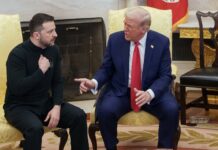Perhaps one of the most frustrating aspects of African politics is that much of the world views our continent through the lens of African politicians. The reality is that, the only glimpse that many outsiders get of Africa, tends to be through major political events that take place on the continent. As a result, African politicians tend to be front and centre in the eyes of the foreign media.
As a result, there are many who may come to the conclusion that African politicians are largely representative of Africa as a whole, which could not be further from the truth.
I think this is truly a point worth emphasising, that Africa’s leaders do not represent African people. That is perhaps the great tragedy of our current political systems, is just how disconnected and out of touch our political class is, from the rest of us.
One of the biggest manifestations of this reality can be viewed just by looking at the average age of African politicians. Despite the African continent having the youngest population in the world, many of our politicians are many decades older than the median age in our countries. According to the Wilson Centre, the median age across Africa is 19 years old however, the median age of Africa’s leaders is around 63 years old.
While the lack of youth representation is a major problem, it really would be a big deal if African leaders were, at least, representative of the values and aspirations held by most of us in the general population. This is the area where the lack of representation becomes a major concern.
Disillusionment with political systems
A result of this lack of representation in government has resulted in large swaths of Africans becoming completely disillusioned with their country’s political institutions. Many have come to the conclusion that it simply is not worth the trouble even attempting to be more politically engaged.
Younger Africans especially tend to feel the most amount of apathy towards their country’s government. The lack of career opportunities, which have led to many young people struggling with unemployment, have left many dejected with their politicians.
It would, however, be wrong to say that young people have no interest in effecting political change at all. However, it is often the case that many simply become disillusioned with the political process, after seeing their efforts towards effecting change fail time and time again.
The broken promises from politicians, instances of electoral fraud, rampant government corruption, lack of accountability etc., has meant that many Africans, younger Africans especially, just don’t bother to be more politically engaged.
However, those who still try to work towards change, often come across barriers put in place, aimed at maintaining the status quo.
Barriers to entry
Perhaps one of the major reasons for this lack of representation among African leaders is due to the barriers put in place by political leaders, aimed at preventing their opponents from gaining any kind of power or influence.
There are numerous tactics used by politicians in positions of power to stifle their opposition. These strategies are designed to prevent anyone who has the potential to take over their positions from advancing.
Electoral commissions, that are responsible for facilitating the electoral process in, are typically used to undermine the integrity of elections in order to prevent opposition candidates from being able to fairly compete.
Things such as exorbitantly high electoral fees are used to discourage candidates from participating in elections, or overly bureaucratic procedures are put in place to prevent candidates from competing.
These tactics are used to undermine the legitimacy of elections and make it that any viable opposition that may be more representative of us normal citizens, don’t even manage to make it through the door; let alone mount a challenge against the ruling class.
Africans seek opportunities
While it’s important not to generalise that general African populace as being politically homogeneous, there is one thing most of us agree upon, which is that we all are in search of greater opportunities.
The self serving nature so many African politicians has worked to significantly stifled the economic development of our countries. As a result, basic infrastructure required to facilitate economic development is inadequate in many of our countries.
Most Africans are only interested in being able to afford to live normal lives; where they are able to support themselves and their families. However, the greed and self-centred nature of much of Africa’s political class has caused that ambition to be out of reach to many of us today.
That is why the idea that Africa’s leadership should be seen as being representative of us African citizens is so troubling. Please do not try to equate us with them.












